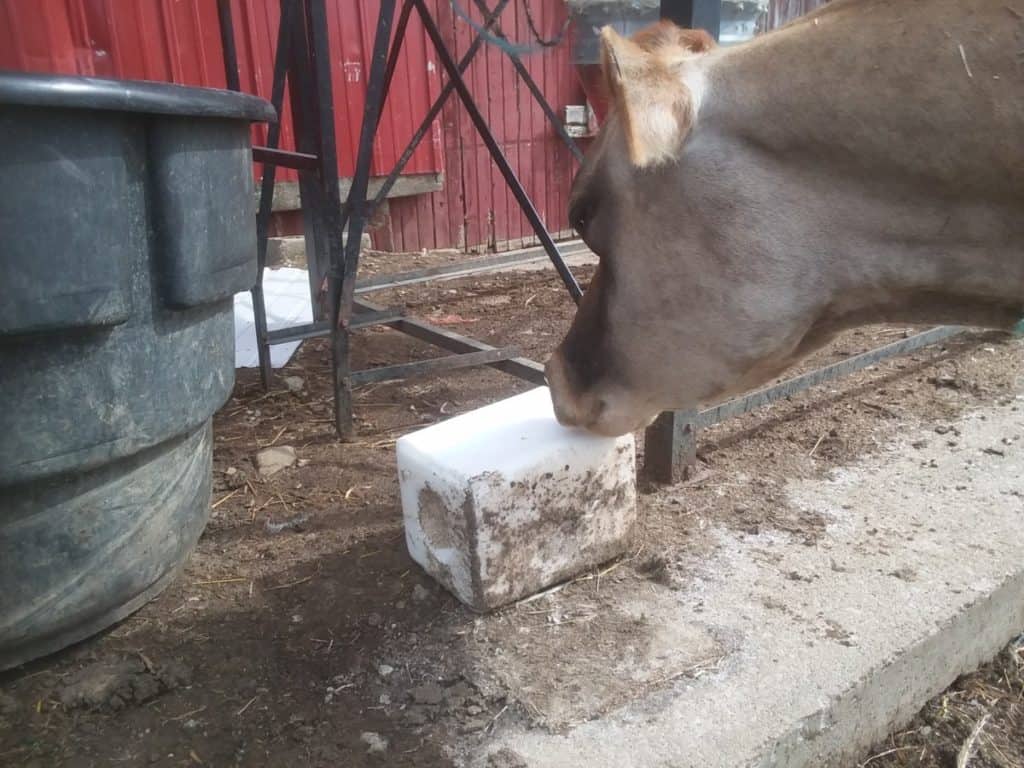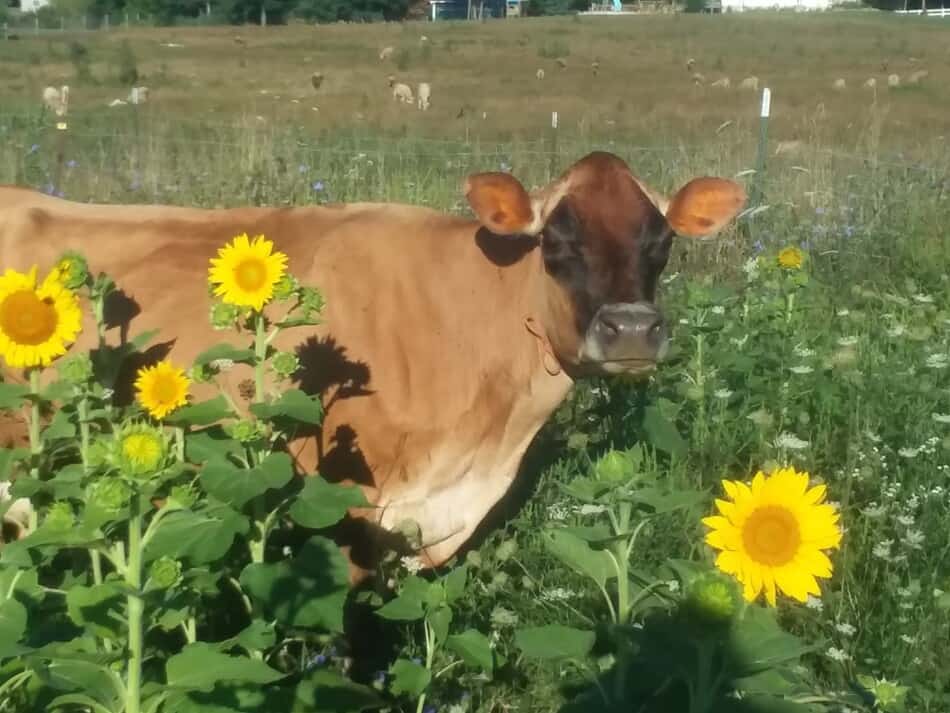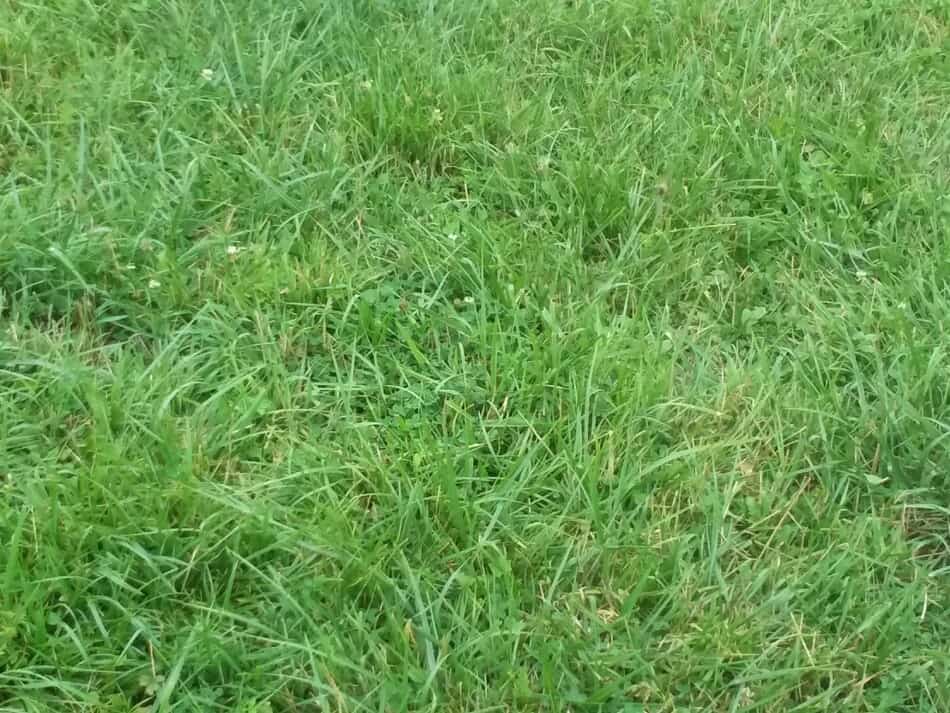Wben Does Beef Cattle Need a Salt Block

Ever wonder what you cattle need that salt block for anyway? Sometimes they are all over it, other times they seem to ignore the thing.
What's going on here?
Cattle need salt to balance changing potassium and magnesium levels in the forages they are eating and to help prevent bloat.
In the spring, the grass will all of a sudden seem to jump out of the ground and start growing like crazy.
Yes, this is what we have been waiting for all winter!
It's so true that nothing feels better than walking through the pasture of new lushly growing grass and see your stock grazing.
With all that growth also comes big changes in the grasses, themselves so big changes in your cattle's diet. This can be where things get dicey.
All that new grass growth does not have the same mineral content as the same grass growing more slowly.
Family Cow 5 Best Breeds gives you our top picks for a family cow that you'll love having as part of your life.
The cow's body prefers salt to fix imbalances
Grass consumed after a frost has nitrates the cow needs to get out of her body.
If she is short on salt her body grabs another easily available cation (magnesium first then calcium) to get rid of the nitrates.
Now she is depleting essential minerals and is on the way to going down with grass tetany (also called grass staggers).
However, with plentiful salt in her diet the easiest way for her body to remove the nitrates is to use salt.
Salt is the preferred cation for the body to use but it also has a minimum amount that her system needs to keep on hand.
Instead of running short on salt her body will grab something else to use and that is where the problems start.

Cattle need salt to prevent bloat
Bloat in cattle is much more common on new growth forages, especially legumes like alfalfa and clover.
When a cow bloats the microbes in her stomach are producing gas faster than she can get rid of it.
If not stopped, this will kill her, sometimes quite quickly. Free choice salt will help prevent this situation.
Plentiful salt for your cattle, as mentioned above, is an important preventative measure since the cow's body prefers salt to fix metabolic problems.
If the salt is not available, her body will start using other minerals.
Salt heads off these problems by allowing the cow to fix her own imbalances without sacrificing other minerals that would compromise metabolic function.
"However, if cattle have adequate salt, they generally won't die of bloat. There is a close relationship between bloat in cattle, grass tetany, and lack of salt, The cattle are bloating because they need calcium and magnesium for proper muscle contraction."
Thomas Swerckzek, veterinary pathologist
Cattle eating lush grasses need salt
Another common imbalance due to lush grass growth is high potassium. High potassium in particular influences likelihood of milk fever and down cow syndrome.
Why? Sudden changes in the weather, especially frost and freeze conditions, cause a decrease in sodium, calcium and magnesium in the plant but an increase in potassium.
Cool season grasses, which would be any grass starting to fire up growth while the ground is still freezing and thawing, are especially the culprits here.

High potassium suppresses cattle immune systems
Excessive potassium also causes immune suppression in livestock, so the cattle are more vulnerable to infectious and opportunistic diseases.
The extra potassium promotes the overgrowth of microorganisms in the plants that are hard for the cattle to handle metabolically.
These "bad" bacteria and fungi from the plants that are now in the bovine stomach will continue to rapidly grow and produce toxic by products.
Immune suppression and possible fetal (unborn calf) death are the results if this overgrowth is left unchecked.
So what does this have to do with salt exactly?
Having salt available to the cattle at all times will counteract the problems that can result from excessive potassium and other mineral imbalances.
Feeding readily available sodium appears to counteract excessive forage potassium. It also discourages overgrowth of potentially pathogenic oportunistic organisms in the gut, while potassium encourages their overgrowth in the gut.
Beefmagazine.com T.W. Swerczek DVM, PhD
Cattle need 35-45 grams of salt per day
A general guideline is that a cow needs 35-45 grams of salt per day.
This means that a herd of 100 head of beef cattle will need a 55 pound bag of salt every week. As mentioned in the rest of this article the salt needs of the herd will actually vary, sometimes quite a bit.
We always put out a salt block, if the animals are really hitting them hard, like they can't seem to get enough licked off of the block, then we put out more blocks so they don't have to wait or just put out a bit of loose salt.
Cattle will lick a salt block
An easy answer is just have a salt block available at all times to the cattle.
If you feel they are not getting enough salt, especially in a high demand situation, then you can also give them free choice loose salt in a pan or part of a trough.
Not surprisingly, cattle salt intake is lower with a salt block than with loose salt, so if you need a lot more salt available to your herd now go for the loose salt.
Be sure to cover it or the rain will wash quite a bit of the loose salt on to the ground.
Increased salt needs equal increased cattle water needs
Be sure to give the cattle plenty of water.
Taking in extra salt means they need extra water to mobilize the minerals like the salt in their body.
Lush spring grass growth is actually pretty "watery" so they normally won't need much extra water when on well growing grass.
If they would happen to take in a bunch of salt at one time the water from the grass alone will not be enough.
Cattle can choose salt amounts with a salt block
The salt block gives the cattle the ability to self regulate salt intake.
Depending upon her individual body metabolism, the feeds she is eating and her production needs (is she pregnant or lactating) her sodium/salt needs will vary throughout the year.
If your cattle are all steers then the same idea of changing metabolic needs applies as well, just for different reason. This time the body needs to support fast growth and efficient feed usage.
The salt block form will still wash away in the wet weather, but much more slowly than loose salt.
The salt block gives the caretaker options regarding where to put the cattle as well.
Sometimes a trough or feeder is not a reasonable option in a particular pasture but a salt block can just be tossed out on the ground.
Cows Need Salt To Avoid Grass Tetany is an Angus Beef Bulletin article getting more specific on the problems of low to no salt with cattle on pasture.
Cattle need salt in the winter
Cattle need salt everyday, just like you.
In the winter cattle would be eating hay and possibly supplemental feed, so most of their salt needs would be taken care of.
All feed sources, forages included, would naturally have some salt in them.
Just to be sure keep a salt block available at all times anyway. It's a cheap way to let the cattle balance their own minerals when they feel they need to.
Get a salt block at a farm store
Your local farm store or feed mill will have salt blocks.
There are different types of salt blocks
You'll have at least two, maybe three choices of salt blocks for your herd.
The blocks that are white are just salt.
The brown blocks are salt and a mineral.
The blue blocks are salt with cobalt and iodine, which is not needed in my area but may be something you need to look into.
How can you tell which one to buy? Easy, just look at the selection in the farm store.
They will have what is popular for your area. Do a quick bit of research on your phone and this should be easy to figure out.
Mixed species grazers use white salt blocks
It should be noted that if you are grazing multiple species together not all animals can have the same minerals.
This is especially true with sheep and cattle grazing together. If you just have cattle, nothing to worry about just put a salt block out there.
Resources: Beef magazine.com Don't Short Salt by T.W. Swerczek, DVM, PhD; The Western Producer, How much salt do cows need when on pasture?; Hereford World, Pasture Problems by Heather Smith Thomas
Related Questions
Do cows need shelter from the rain?
If the cattle are in good body condition, then they only really need shelter from the wind and sun.
If the cattle are thinner, have new calves or if the temperature is below 50 degrees then shelter would be good during the rain.
Do cattle need shade?
Shade is needed for cattle that are not adapted to the heat of your area.
Some cattle breeds are genetically able to handle more heat and need less shade, while other breeds are very poor at handling heat and will definitely need to have shade available.
Getting cattle that are suited to your area will go a long way towards removing this concern.
Source: https://familyfarmlivestock.com/salt-why-your-cattle-need-it/#:~:text=Cattle%20need%20salt%20in%20the%20winter&text=In%20the%20winter%20cattle%20would,available%20at%20all%20times%20anyway.
0 Response to "Wben Does Beef Cattle Need a Salt Block"
Post a Comment